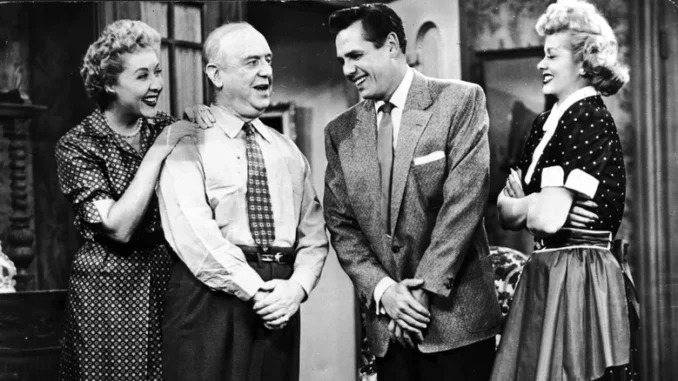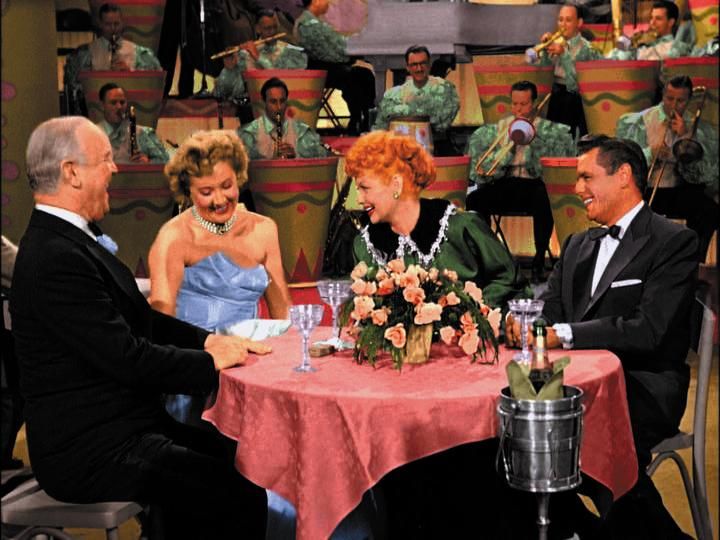
A Hollywood Classic With a Hidden Clause
I Love Lucy remains one of the most beloved sitcoms in television history — a groundbreaking comedy that defined the golden age of TV. But behind the laughter, glamour, and slapstick charm of Lucille Ball and Desi Arnaz’s legendary show, there was a hidden clause that revealed the darker side of Hollywood’s beauty standards.
Vivian Vance, who played Ethel Mertz, Lucy Ricardo’s witty and loyal best friend, was reportedly forced by her contract to weigh at least 10 pounds more than Lucille Ball. The stipulation was meant to maintain a specific “contrast” between the two women — one as the glamorous lead and the other as her frumpy, comedic sidekick.
It’s a detail that still shocks fans and underscores the harsh gender expectations that shaped Hollywood in the 1950s.
The Origins of the Controversial Clause
When I Love Lucy premiered in 1951, Lucille Ball was already a well-known actress, and the show marked her major transition from film to television. Casting the perfect “neighbor couple” — Fred and Ethel Mertz — was essential to the show’s chemistry.
Vivian Vance was a seasoned stage actress, talented and charismatic. But when she landed the role, studio executives reportedly felt she looked “too attractive” to play Ethel, who was written as the older, more ordinary friend to Lucy’s youthful charm.
To reinforce the visual dynamic between Lucy and Ethel, Vance’s contract required her to maintain a weight difference from Ball, specifically by being heavier. It was a cruel condition rooted in 1950s Hollywood misogyny, where women’s appearances were treated as part of their job description — and often, their career survival.
Vivian Vance’s Quiet Struggle on Set
Vance was reportedly humiliated by the requirement. Sources close to the production have said she often battled insecurity about her appearance and the way audiences perceived her next to Ball.
She once confided to friends that she felt trapped by the image I Love Lucy created for her — one that she could never escape. “I was Ethel Mertz wherever I went,” she lamented. “People expected me to be dowdy and loud, even in real life.”
Adding to the tension, Vance’s co-star William Frawley (Fred Mertz) was 22 years her senior. Their on-screen marriage often played into the comedic idea of an “unattractive couple,” something both actors reportedly disliked. The age gap and the show’s focus on appearances made Vance’s frustrations even more personal.
Lucille Ball and Vivian Vance: A Complicated Friendship
Despite the industry’s harshness, Lucille Ball and Vivian Vance developed a genuine friendship that lasted for decades. Ball, who was both the star and producer of the show, valued Vance’s comedic timing and intelligence, even if studio executives pushed to keep the physical contrast between them.
Their chemistry was the heartbeat of I Love Lucy, and their friendship often transcended the pressures placed upon them by Hollywood.
In later interviews, Ball reportedly regretted the way the industry — and sometimes even the show’s own production — treated Vance. “Viv was brilliant,” Ball said. “I couldn’t have done Lucy Ricardo without her.”
Still, the two women occasionally clashed over how the show framed their appearances. Vance reportedly grew frustrated by how Lucy was always given glamorous wardrobe choices, while Ethel was dressed to look plain and older.

A Reflection of 1950s Hollywood Standards
The contract clause demanding Vance weigh more than Ball wasn’t unique in that era. During the 1950s, many actresses were subjected to strict appearance rules that dictated everything from hairstyle to body measurements.
However, Vance’s case remains one of the most infamous examples of Hollywood’s obsession with controlling female identity — particularly in comedy, where beauty and relatability were seen as mutually exclusive.
By making Vance appear “less attractive,” the network believed audiences would more easily root for Lucy as the leading woman. But ironically, Vance’s natural charm and comedic brilliance often stole the spotlight, proving that talent couldn’t be measured on a scale.
Vivian Vance’s Legacy Beyond the Scales
Despite the unfair conditions, Vivian Vance turned Ethel Mertz into one of the most iconic sitcom characters in television history. Her impeccable timing, physical comedy, and emotional depth made her more than just Lucy’s sidekick — she was a comedic powerhouse in her own right.
After I Love Lucy, Vance continued to collaborate with Ball on The Lucy Show and Here’s Lucy, where their friendship remained strong until Vance’s passing in 1979. By then, her legacy had outgrown the limitations of her early contracts.
In many ways, Vance’s experience represents a quiet act of resistance. She took a role designed to limit her and transformed it into something unforgettable. Today, she’s remembered not for her weight, but for her wit, warmth, and humanity — qualities that helped shape modern television comedy.
The Lasting Lesson
The revelation about Vance’s contract serves as a reminder of how far Hollywood has come — and how much further it still has to go.
While actresses today face fewer explicit clauses about appearance, the industry continues to grapple with unrealistic standards of beauty and age. Vivian Vance’s story remains a powerful cautionary tale about what happens when art and image collide — and how real women often pay the price for entertainment’s illusions.
More than 70 years later, I Love Lucy still makes audiences laugh. But knowing what went on behind the scenes adds a bittersweet truth to the joy: that even in comedy, women had to fight twice as hard to be seen, heard, and respected.